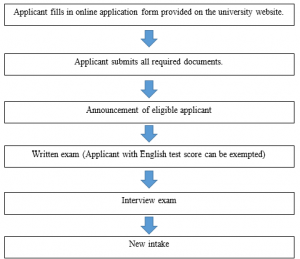AUN-1 AUN-2 AUN-3 AUN-4 AUN-5 AUN-6 AUN-7 AUN-8 AUN-9 AUN-10 AUN-11
ผลการประเมินตนเอง

8.1 There is a clear student intake policy
New intakes to the programme are carefully considered. English proficiency is the first thing that we consider. As stated, applicants must pass our written exam for English proficiency or provide their Standard English test score. If the applicants do not possess our required English proficiency, we know that they might have problem in surviving in our programme anyway. Also, it can be difficult for us to control the student quality. Therefore, we do not admit applicants with lower English proficiency.
After the written examination or the presence of English proficiency test score, the applicants are invited for an interview. Here, the interviewer pay attention to the applicant’s English oral communication skills, attitudes and suitability.
It should be noted that the maximum number of intakes to the programme per year is 15. We prefer a small size of intakes to control the quality of teaching (teachers’ workload, number of teacher/student).
8.2 The student admission process is adequate
Admission process

8.3 The actual study load is in line with the prescribed load
Students are scheduled for their study based on the prescribed course structure.
Table 8.2 Programme course structure
| Term | 1 | 2 | 3 |
| Year 1 |
|
||
| Year 2 |
|
OR
|
OR
OR |
Each course earn 3 credits. It requires students to study in class for three hours a week, 15 weeks a term and to study outside class by themselves for 9 hours a week.
Record of student’s grades and GPA is kept in the university intranet system. Academic advisor, programme director, teaching staff and academic service officer are authorized to view the record. When students start to have some problem in their study (i.e. not getting the pass grade: B), the academic advisor arrange a personal meeting with that student so as to help he plan his study more effectively.
Another way to monitor students’ progress in that the programme arrange a sharing session every semester. The session is usually a week after the semester ends. Students are required to present their progress. The initial rationale behind this activity is to gently force students to reflect and evaluate their own progress. This is especially students who are in their last year and must complete their research project. Once they know their own progress and causes of learning problems, they get suggestions for future improvements.
Also, online questionnaires are provided for students to give feedback to the courses and teachers. Students do the questionnaires twice a term (mid of the term and end of the term). Thus, they can communicate directly the issues related to their study and performance, needs, and so on.
Not only the formal session, can students make a request to meet with their academic advisor or teachers for consultation. The relationship between academic staff and students in the programme is very friendly. We do not only build rapport in classroom, but also we usually arrange extra and informal outside class activities such as outing, study trips, welcoming activities, parties and so on. With this kind of friendly relationship, students feel comfortable to share their feelings, problems, or success stories with the academic staff.
เอกสารอ้างอิง
- 8.1 ข้อมูลผลงานตีพิมพ์เผยแพร่นักศึกษาระดับบัณฑิต คณะศิลปศาสตร์ 2559
- AUN 6.12 Research discussions research clusters 2014-2016
- AUN 8.1 ผลประเมินผู้สอนโดยนักศึกษา 2559
- AUN 8.2 Plan of graduate admission 1-2016
- AUN 8.2 Plan of graduate admission 2-2016
- AUN 8.3 ข้อมูลกิจกรรมพัฒนานักศึกษา 2559
- AUN 8.4 จำนวนนักศึกษา
- AUN 8.5 MA 12 credit proposal exam form EPC
- AUN 8.7 Academic Interview EPC
- AUN 8.8 ผลการดำเนินงานงบประมาณ ISOO (Output Based) 2559
Insight SoLA
